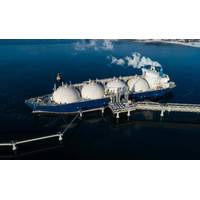Russian Gas Discounts Undermine Italy's Quest For New Routes
- Cheap Russian gas undermines alternative supply projects
- Azeri plan to bring gas to Italy may collapse-analyst
- Plans to expand pipeline links with Algeria, East Med stalled
- U.S. LNG imports unprofitable at current low prices
As Europe looks to wriggle free of Russia's energy grip, state-backed exporter Gazprom is working to convince Italy to stay the course with offers of cheap gas, potentially locking out rival supply from North Africa, the Caspian Sea and shipped LNG.
The race to ring-fence European gas markets from rising competition has led Gazprom to drop its dogged defence of oil-linked gas deals and prompted a spree of price cuts, the latest of which went to Italy's Eni.
"Gazprom, dead set on getting its South Stream gas pipeline project (to Europe) off the ground, will do everything it can to get other, alternative-source projects shelved," one of Italy's top oil and gas officials, who requested anonymity, said.
"Arbitration is under way with a series of clients on long-term gas contracts to make Russian gas even more attractive," he said.
Import-dependent Italy has traditionally taken around a third of its gas supplies from Russia. But with Algerian volumes reduced and Libyan supplies vulnerable to conflict, Russian flows now account for around half of Italy's daily imports.
In May Gazprom granted Eni its first gas supply deal not indexed to oil prices.
With European gas prices currently at 5-year lows, the indexation change implies a 30-percent gas price cut versus the average of $380 per 1,000 cubic metres which Gazprom says it charges European clients.
"Russia has the room to cut prices and make life hard for newcomers. They have the scale economies, their production costs are low and they have a lot of export infrastructure already in place, amortised," said Davide Tabarelli, head of Italian energy think-tank Nomisma Energie.
Caspian Doubts
Russia's second-biggest EU gas client, Italy plans to be a landing point for new pipelines from Azerbaijan, the east Mediterranean and Algeria in coming years, as well as a hub for ocean-going LNG tankers.
Gazprom's pricing U-turn threatens to render these supplies unprofitable while also deterring supply through established links, most noticeably Algeria, undermining Italy's attempts to become a southern European gas hub.
Touted as Europe's best hope of diversifying import sources, the Trans Adriatic Pipeline (TAP) is to be a vital link in a 3,500-kilometre chain bringing gas from Azerbaijan's offshore fields in the Caspian to Italy.
In its first phase, Azerbaijan's giant Shah Deniz II gas field aims to pump 6 billion cubic metres (bcm) to Turkey and a further 10 bcm to Italian and other European buyers via TAP.
But investor exits by Germany's E.ON and France's Total last week - which some link to Gazprom's pricing cut - may hinder Europe's quest for diversification, sources say.
"It is only a matter of time before they abandon the idea to build the pipeline link into Italy," Societe Generale analyst Thierry Bros said, adding that transit country Turkey may take the gas instead.
A source close to the matter said Croatia, which has ambitions of its own to be a gas hub, had been lobbying to have the Azeri pipeline routed to its territory.
A TAP spokesman said plans were unaltered, adding that gas supply deals with European buyers are locked in.
In addition, weak gas prices helped undo plans for a new liquefied natural gas (LNG) export project in Israel last month.
Plans to expand gas pipeline links between Algeria and Italy have also stalled, as have efforts to link up with major gas finds in the eastern Mediterranean.
Gas Dominoes
The change in Russian pricing has also fundamentally altered Italy's ties with its second-biggest gas supplier, Algeria, the consequences of which are likely to have an impact on Spain and global LNG supplies.
Eni and Algeria's Sonatrach agreed last year to cut flows into Italy by half, diverting some of the gas into Spain as part of a temporary fix to address Italian oversupply. Full flows are due to revert back to Eni in October.
But Eni's deal with Gazprom, which provides for cheap gas as well as a large backlog of supply owed by Russia, promises to extend Algerian diversions into Spain until 2016, according to Massimo Di-Odoardo of energy consultants Wood Mackenzie.
"We think the Algerians don't have enough gas available to resume previous flows to Italy without cutting back on deliveries to Spain or further reducing LNG exports," Di-Odoardo said.
The likely extension of piped gas flows into Spain will in turn give traders there more flexibility to divert LNG cargoes to world markets, aiding gas-short consumers in Asia and South America.
The Gazprom deal gives Eni the chance to pull in more Russian gas and displace costlier supply from rival sources.
"Inevitably, this would result in Russia's share of the Italian market remaining sustained at the levels we have seen since 2013, something that could pose some risks given Russian gas to Italy has to transit Ukraine," said Di-Odoardo.
With gas prices currently treading at $7 per mmBtu levels, even the prospect of U.S. LNG exports cannot hope to make inroads in Italy.
(By Oleg Vukmanovic and Stephen Jewkes, Reporting by Stephen Jewkes; editing by Jason Neely)







